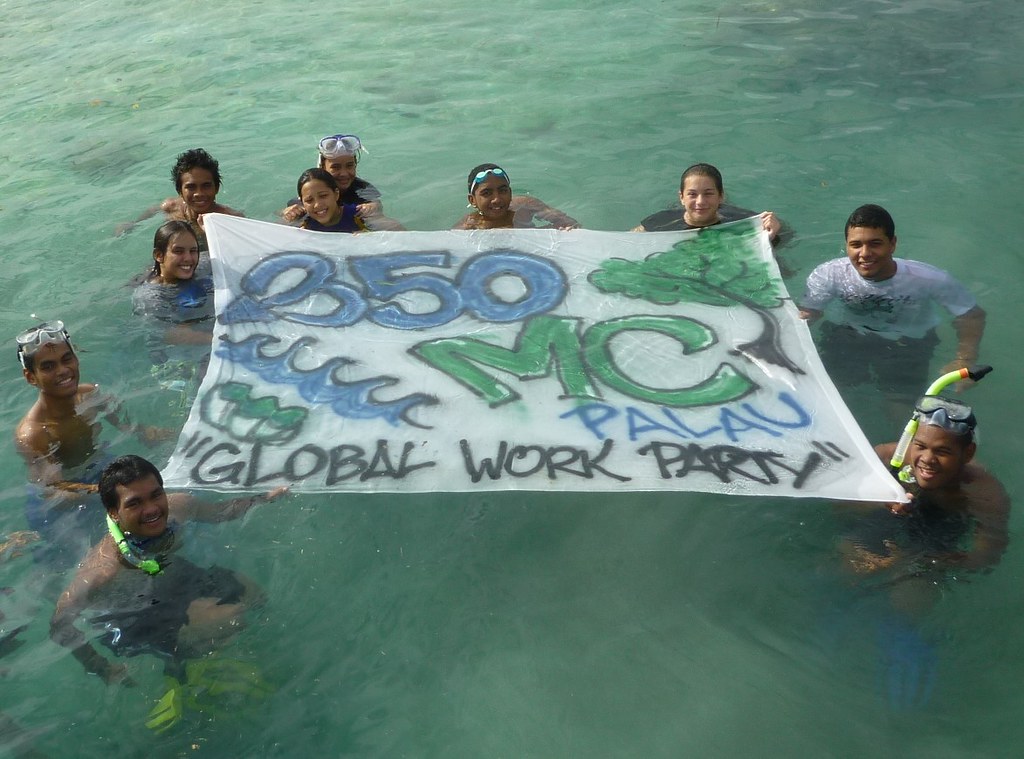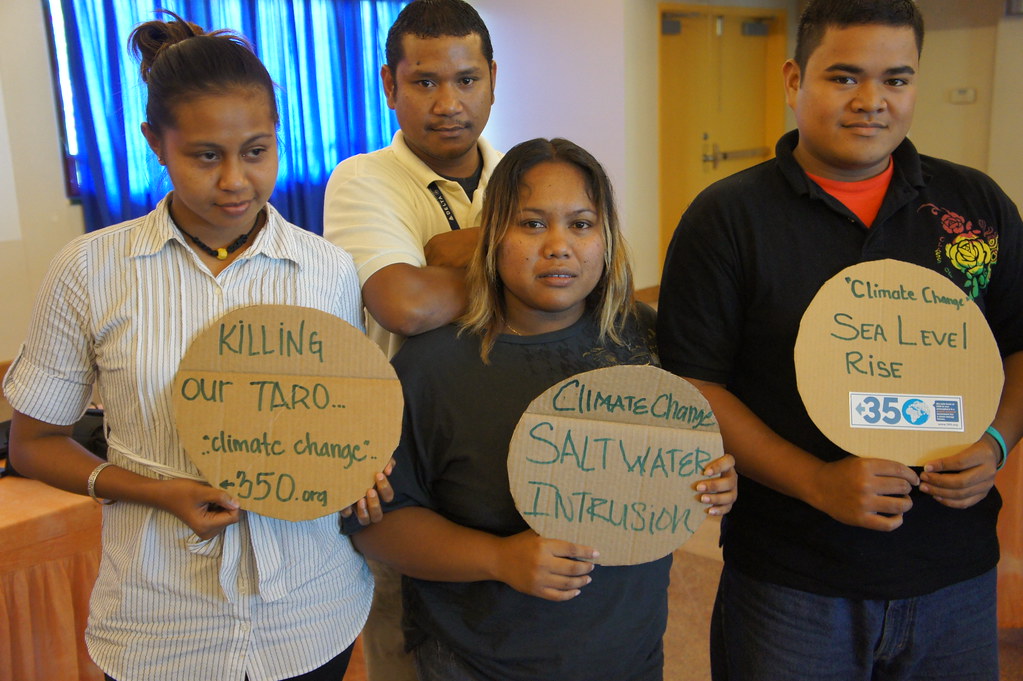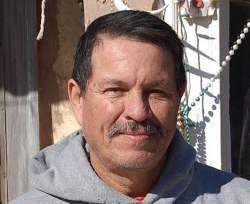“EVACUATE! EVACUATE!”
This post comes from Zeph Danieles from the Philippines, one of the new 350 East Asia coordinating team members...
“EVACUATE! EVACUATE!” ... repeatedly uttered when Typhoon Bopha neared. “EVACUATE...NOW!” ... not good news -- but seemed to be the only chance of survival.

Typhoon Bopha came with a roaring sound of the wind attacking the walls and scraping the roof. Many cried in fear. Outside was a strong wind and heavy rains. Trees and electric posts fell and knocked down concrete structures nearby. Power was cut-off and radio lines were silenced by the ravaging storm. In regions with open pit mining, particularly in Compostella Valley (one of the hardest hit areas), mudslides washed out houses and lives.
Stocktaking at COP18
I am writing this from the Qatar National Convention Center, where negotiators are still convening well into the night, on the last stretch of yet another UN climate summit. I am however feeling very detached from it all, partly because there are no indications that the outcome will be fair, just or in-line with the science, but also because as I sit here I realize that the relationships I formed over the last two weeks with the youth of the Arab Youth Climate Movement (AYCM) are for me the most significant outcomes from this conference.
While a number of civil society groups and coalitions have scaled back their participation at this year's UN summit in Qatar, the Arab Youth Climate Movement (AYCM) has been participating in full force.
![]()
It's hard to believe that this network of youth climate activits came into existence only 12 weeks ago at the AYCM inaugural workshop in Cairo, which I took part in organizing. From that workshop onwards, national coordinators set about to recruit local teams to organize the very first Regional Day of Climate Action on November 10th. What started off as a small group of 20 or so national coordinators has quickly become a network of 200 organizers and around 1,000 fans (and growing).
Only 12 days after this largely successful day, AYCM was quickly plunged into UN climate negotiations here in Qatar-- a physically and emotionally taxing experience that I still struggle to cope with but that they've handled like pros.
The dedication and passion that youth from these Arab countries have brought here has been truly inspiring;
They came here with a message to urge Arab countries to take leadership on climate, and delivered petition signatures urging their leaders to pledge to reduce their emissions .
![]()
They also questioned the Arab world negotiators with such passion and honesty. This was something new and startling to many Arab world negotiators, as evident by the expressions of alarm on the faces of certain delegates who rushed out of the Arab League room as soon as they saw around 30 Arab youth coming their way.
However, perhaps the Philippines' lead negotiator Naderev " Yeb" Saño put it best when he said, "Climate Change will not be solved by conferences. It will be solved by youth like you -- by actions at the grass roots level."
This sentiment has been increasingly shared by many after witnessing the slow process here at the negotiations. Lets face it; our movement so far has not been powerful enough to achieve what science and justice say is necessary to get us back on track to a 2 degree world, let alone a 350 ppm one. That is why I'm excited about GlobalPowerShift.org; a global climate convergence happening in Istanbul between June 10-17, 2013 which will be a launch pad for us to scale up our movement like never before and summon an unprecedented level of political pressure for climate action by 2015 (the year when a global climate deal is set to be in place).
As predictable as the outcomes of this last night of negotiations might be, the outcomes of youth organizing are far from it. As Abdullah from Bahrain put it "It's taken us a while to be a part of this global movement but we're finally here and we're just getting started."
Day One Highlights: Power Shift NZ-Pacific
We just wrapped up the first day of Power Shift NZ-Pacific here in Auckland, New Zealand. With young people from across New Zealand and 13 Pacific Islands - it's been an amazing and energetic day. We're dog tired, so we'll leave the highlight reel to demonstrate just what went on. Two massive days of world changing ahead, we'll keep you posted.
Click "Read More" to view ->
Fossil Fuel Divestment Campaign Featured in the NYT!
Here's an email Bill McKibben just sent out to the 350.org list:
My last 24 hours:
1) Do the final show of the #DoTheMath tour -- as usual, a sold-out, full-of-power evening, this one in Salt Lake City with my old friend Terry Tempest Williams.
2) Get myself home for the first time in a long while -- happily, both my wife and dog seemed to recognize me.
3) Open the computer and find this article about the Do the Math Tour and fosil fuel divestment on the front page of the New York Times -- a huge, prominent vindication of everyone’s hard work. Here's what the website looks like as I type this:

The article in The New York Times tells the story of students, faculty and alumni around the country who are demanding divestment from fossil fuels. On a few campuses, like Swarthmore, they’ve been at it for semesters -- but all of a sudden, as the article says, they find themselves “at the vanguard of a national movement. In recent weeks, college students on dozens of campuses have demanded that university endowment funds rid themselves of coal, oil and gas stocks. The students see it as a tactic that could force climate change, barely discussed in the presidential campaign, back onto the national political agenda.”
The picture that accompanies the article comes from our Minneapolis roadshow last Friday night, and the article concisely lays out the demands and the strategy of the campaign. It’s precisely the boost we need. So please, go read it here: www.nyti.ms/SESrfr
We’re quickly getting traction, but we can get more if we have your help.
So, first things first: please email the article by clicking the "E-Mail" button on the New York Times website -- if we can get it on the newspaper's "most emailed list", we can help make sure it goes as far as possible, as fast as possible.
For full instructions on how to email the article, click here: www.350.org/nyt
After you've emailed the article, start thinking about ways you can join in this fight. If you're a student, you can join in on campus. If you're an alum, you can help pressure your alma mater. You can also push for divestment at your church or synagogue or mosque, or in the pension system that invests your retirement dollars.
We can make this whole movement go viral fast. Indeed, given the state of the climate science, we’ve got to. So please, share the NYT article by following these instructions.
I’m going off to bed because I’m exhausted. But I’m pretty sure the last month has been entirely worth it.
Onwards,
Bill McKibben for the whole crew at 350.org
Super Typhoon Bopha has ripped through Palau
Right now, the Pacific Island nation of Palau is in a State of Emergency. Super Typhoon Bopha just ripped across the islands, causing what President Toribiong called “catastrophic destruction". While there is no reported loss of life yet, the winds and storm surge resulted in “scores of people … rendered homeless for the foreseeable future.”
As you can see, our friends in Palau have been a big part of the 350.org movement in the last few years. Earlier this year in preparation for the Connect the Dots day of action, we worked with our team there (led by Leonard Basilius at the Palau Community Action Agency) to hold the 350 Palau Youth Climate Leadership workshop. It's really tough to know them personally, know that they're hurting right now, and there's not much we can do to help.

The most important thing we can do is stand is solidarity with them, make sure their story is heard, and keep organising and fighting to move the world beyond fossil fuels. I'm writing this from Auckland, New Zealand - where we are half way through the Pacific Youth Looking Beyond Disaster forum, which is a collaboration with UNESCO New Zealand. We just held a minute of silence in prayer for our brothers and sisters from Palau.
The forum is made up of 50 young people from across New Zealand the South Pacific Islands, from Tokelau to Kiribati. We've been - as the name suggests - sharing stories of facing and recovering from disasters. We've also been planning a Pacific wide climate campaign - to be launched in a couple of days time, at Power Shift NZ-Pacific.
Starting on Friday, we've got 700 young people converging for Power Shift NZ-Pacific, where we'll be hearing from the likes of Bill McKibben, Naomi Klein to our Pacific organisers like Christina Ora and Brianna Fruean. Never before has the climate movement in the South Pacific come together like this. We'll report back on that soon, but for now, we're sending strength, hope and solidarity to our friends in Palau.

Daniel Dancer’s Latest 350 Masterpiece featured on Today Show
 Our dear friend and frequent collaborator Daniel Dancer -- who has worked with us from India to Washington, DC -- recently produced a new piece that was featured on the Today Show. In this example, Dancer worked with 1,200 students in North Carolina to send this climate message. You can read more about this piece, and Daniel's work, here.
Our dear friend and frequent collaborator Daniel Dancer -- who has worked with us from India to Washington, DC -- recently produced a new piece that was featured on the Today Show. In this example, Dancer worked with 1,200 students in North Carolina to send this climate message. You can read more about this piece, and Daniel's work, here.
Climate march through the streets of Doha
It wasn't the largest international climate march there has been -- except that it was the first ever protest march of any sort here in Doha, Qatar. Hundreds of people joined the march organized by Doha Oasis, IndyACT, and the Arab Youth Climate Movement. It was an unprecedented event for the local climate movement and a beautiful expression of the energy and passion of the Arab Youth Climate Movement.
It is abundantly clear that the UN meetings will not deliver action according to what science and justice demand until our movement outside the meetings is larger and more powerful. In that light, to see the movement pick up here on the streets of Doha and build momentum for the whole Arab region is most hopeful aspect of this convergence here in Doha. It's up to all of us to keep that momentum going now -- not just in the Arab world, but everywhere.
Doing the Math: Carbon Zero
We're doing the math, but what's the right answer? According to Alex Steffen, it's zero. Zero emissions, that is.

Sooner or later (hopefully sooner) we're going to need to stop adding more CO2 to the atmosphere. In his new book, *Carbon Zero: Imagining cities that can save the planet*, Steffen argues that cities can and should take the lead in getting us there.
Steffen explores how through taking bold action now, cities can cut their emissions down to net-zero. By shifting away from energy-intensive centralized and car-dependent systems to people-focused communities and energy-frugal innovations cities can cut deeply the amount of energy they need to provide a high quality of life, and then meet the remaining demand with clean sources like wind and solar. Zero won't be easy. But zero is achievable. Steffen's book is a short, compelling tour of the urban future that invites us to imagine winning the climate fight.
Steffen's also a big supporter of 350. So he's inviting 350 supporters to read his book, for free. Just sign up at https://eepurl.com/snCQv to receive a PDF of Carbon Zero you can read and share.
Want to read it online? Grist is featuring the book for a week, sharing a chapter a day: https://grist.org/cities/how-
Divest!
The email below just went out to our supporters in the USA. Not on our list yet? Sign up here!
Greetings from the Do The Math tour bus!
We’re bouncing up the road to Madison, WI right now after another sold-out show in Chicago last night.
As you might already know, one of the goals of this tour is to launch a new fossil fuel divestment campaign at colleges and universities across the country -- it's a critical way to fight back against corporate polluters.
Here’s how you can help:
If you’re a current student, please click here to join or start a campaign on your campus on our brand new website: gofossilfree.org
If you’re an alumnus/alumna, please click here to tell us where you went to school and join the national campaign. We’ll be in touch soon about how you can connect with and support students at your alma mater.
And if you're not a student or an alum, don't worry -- there will be lots for everyone to do in the weeks ahead.
Why divestment? Well, we know that fossil fuel companies are principally concerned about two things: their bottom line and their public image. A nationwide movement forcing our schools to divest from fossil fuels will deal a serious blow to both.
Over 100 campuses have already joined the divestment campaign, and it’s generating real excitement everywhere we go. From big schools like the University of Wisconsin to small colleges like Middlebury, the campaign is picking up speed (at Harvard, a student resolution supporting divestment just passed with 72% of the vote!).
Now, it’s absolutely crucial that we keep the momentum going -- click here to get involved: www.gofossilfree.org
Many, many thanks,
Bill
P.S. You can also follow along with the divestment work on our brand-new Fossil Free Facebook and Twitter accounts.
Houston Residents Worry about Burden of Keystone XL Pipeline on Local Neighborhood
The post below is from our friend Cherri Foytlin over at the Bridge the Gulf Project.

“We are part of America. We are a major city in America, but we do not need to be the sacrifice zone for the nation,” states Houston resident Juan Parras (pictured).
Parras joins a growing contingent of Houston residents concerned about the overburdening of minority and low-income communities in the area with the ill effects of energy production.
“There has been a lot of studies conducted, and one of them in particular is a study conducted on leukemia cases within a 2 mile radius of the Houston ship channel. The chances of contracting leukemia here are 56 percent, and of course, this is related to the petrochemical industry. We also have a lot of asthma, tumors - all of the things people do not want in their communities can be found here.” he explains.
As a founder of the group Texas Environmental Justice Advocacy Services (TEJAS), Parras is no stranger in working to protect Houston neighborhoods from the hazards of air and water pollution. "[TEJAS] started doing environmental justice work here in Houston in the year 2004. There is a lot to be done here, because we have the highest concentration of refineries and petrochemical plants in the nation,” he says.
VIDEO: Community advocate Juan Parras of Texas Environmental Justice Advocacy Services describes the area of Manchester - an environmental justice community in Houston, Texas. Like so many communities across the nation, Manchester disproportionately bears the burden of health problems due to industrial pollution in the area. According to Parras, the Valero plant in Manchester will most likely be a final destination for tar sands oil traveling through the Keystone XL Pipeline. Watch more: Houston Residents Worry About Tar Sands Oil Pollution